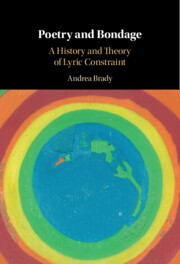Book contents
- Poetry and Bondage
- Poetry and Bondage
- Copyright page
- Dedication
- Contents
- Illustrations
- Acknowledgements
- Introduction The Fetters of Verse
- Part I Lyric Cells
- Part II The Songs of Slavery
- Chapter 5 Bind Me – I Still Can Sing
- Chapter 6 The Story that Cannot Be Told
- Chapter 7 The Sound Came from Everywhere and Nowhere
- Chapter 8 Singing at the Window
- Part III Pleasures and Ornaments
- Index
Chapter 6 - The Story that Cannot Be Told
M. NourbeSe Philip’s Zong!, from Form to Performance
from Part II - The Songs of Slavery
Published online by Cambridge University Press: 08 October 2021
- Poetry and Bondage
- Poetry and Bondage
- Copyright page
- Dedication
- Contents
- Illustrations
- Acknowledgements
- Introduction The Fetters of Verse
- Part I Lyric Cells
- Part II The Songs of Slavery
- Chapter 5 Bind Me – I Still Can Sing
- Chapter 6 The Story that Cannot Be Told
- Chapter 7 The Sound Came from Everywhere and Nowhere
- Chapter 8 Singing at the Window
- Part III Pleasures and Ornaments
- Index
Summary
Dickinson’s inability to tell the story of slavery is contrasted with M. NourbeSe Philip’s lifework Zong!, a book that attempts to listen to the missing, those who have been obliterated from the judicial archive or murdered in the Black Atlantic. Zong! is derived from a set of procedural constraints, using a legal summary of the Gregson vs. Gilbert decision – a case that determined whether slaves thrown overboard could be claimed as insured goods – to produce sequences of dispersed poems, associated texts and performances. Philip compares these procedural constraints to entering the hold, and her acts of linguistic selection and discarding to those of the slave masters. This radical attempt to restage the violences of history and recover the lost are complicated by her contention that the lyric poet must act as a bridge between the individual and the group. This chapter consider how Philip’s practice moves from page-based experiments with formal constraints, through an antagonistic relationship to the colonial lyric, into collective performance. It considers the significance of re-enactment and ritual in Philip’s work to channel the voices of the ancestors and disrupt the silences of the archive.
Keywords
- Type
- Chapter
- Information
- Poetry and BondageA History and Theory of Lyric Constraint, pp. 180 - 208Publisher: Cambridge University PressPrint publication year: 2021



